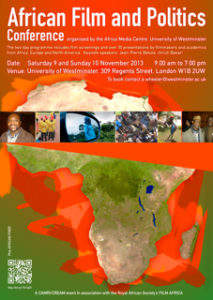Keynote speaker: Jean-Pierre Bekolo
Jean-Pierre Bekolo is an award-winning film director, writer, artist, professor and social activist. He has been making films about his native Cameroon for the past twenty years. His imaginative work criticizes both his country’s dictatorship as well as Western cinematic conventions. Bekolo’s latest film The President will form the case study for his talk about making movies from a mental and physical place. The film is a satire that questions his country’s catastrophic experiments with democracy. It will be screened on Sunday, followed by a Q & A with the director.
Keynote speaker: Imruh Bakari
Imruh Bakari is a writer, academic and filmmaker born in St Kitts. He has published two poetry collections, Sounds & Echoes (Karnak House, 1980) and Secret Lives (Bogle-L’Ouverture, 1986). From 1999 to 2004 he was Festival Director of the Zanzibar International Film Festival. His films include African Tales – Short Film Series (2005/2008), Blue Notes and Exiled Voices (1991), The Mark of the Hand (1986) and Riots and Rumours of Riots (1981). He lives and works between the UK and East Africa. He is a Senior Lecturer in Film and Media Studies at the University of Winchester.
Presentation and screening: Daniela Ricci
Daniela Ricci is an academic and filmmaker. Her 2013 film Creation in Exile features Newton Aduaka, John Akomfrah, Haile Gerima, Dani Kouyaté and Jean Odoutan: five major African filmmakers in ‘exile’. This documentary follows their personal and artistic paths from Paris to Washington, from Ouagadougou to London, via Uppsala. Their everyday lives echo with sequences of their films. Through the gazes of these filmmakers, in search of harmony between different cultures, masks fall and myths are smashed.
This is a two-day conference on African film and politics in changing local and global contexts. Film in Africa, just like popular music, theatre and literature, has reflected and affected past and present political realities. African filmmakers have developed effective and powerful film stories infused with political ideologies, values and everyday politics. Global, national, regional and personal political themes are evident in some of the most popular African films. Some of the films become popular because audiences easily recognize the political portrayals and subtle themes reflected on the screens.
The African film industry is itself ridden with tension, power and politics. Funding, training opportunities, language use, story structures and roles with films are often distributed according to existing political priorities. It is arguable that power relations have followed political thinking. Conditions and the environment of filmmaking in Africa have been political since colonial times. After independence, film politics is more evident in front of and behind the camera. African film audiences are now using social media in ways that have complicated the political dimensions.
However, there are questions about how power and politics have been included in African film. Which African political story is told through films? Whose voice is represented? Who speaks on behalf of whom? To what extent have films expanded identities, power and political relations? In what way has politics influenced film production, distribution, exhibition and consumption in Africa? If political stability and political socialization are the answers in the African film industry, what then are the questions?
This conference seeks to debate issues of politics, ideology, power and diversity in African film industry. It seeks to examine, among other issues, how broadly defined politics relates to generational, gender, ethnic, racial, traditional/modernity and language issues in African films. The conference welcomes contributions that will debate these issues from different theoretical and methodological orientations.
Approximately 40 papers will be presented on topics including:
- Political history, myth and identity in African film
- Racial, class, religious and ethnic politics in African film
- Audiences and the reception of politics in African films
- Indigenous language films and everyday politics
- Gender and sexual politics in African cinema
- Politics of exhibition, financing and distribution of African film
- Power politics and crises in African Cinema
- Film festivals and the development of national cinemas in Africa
- Auteur politics, Political film genres and form
- Collaborative filmmaking in the global north/trans-national collaborations
- Liberation and emancipation in African film philosophy
- Filmmakers exiled or imprisoned for their work
- Institutions, policies and film agencies
Programme and registration
This two-day conference will take place on Saturday 9 and Sunday 10 November, 2013.
The fee for registration (which applies to all participants, including presenters) will be £175, with a concessionary rate of £95 for students, to cover all conference documentation, refreshments lunches and administration costs.
Registration is now open.
- Download the registration form and send it to Amanda Wheeler a.wheeler@westminster.ac.uk
- Download an conference schedule
- Download a list of suggested hotels and youth hostels near Regent Street.


